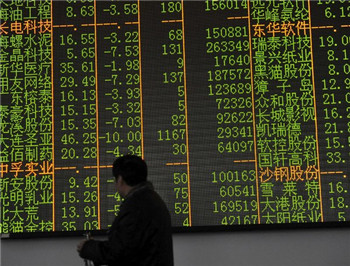(单词翻译:单击)

HONG KONG — Trading was halted on China’s stock market for the second time this week, as stocks plummeted on Thursday over concerns about the country’s currency and the health of the economy.
香港——周四,关于人民币汇率和中国经济状况的担心促使股市再次大跌,导致中国股市交易本周第二度提前终止。
It has been a rocky start to the new year, with worries over China shaking the confidence of investors around the world and creating volatility in the markets. The big fear is that China’s economy is slowing down, crimping global growth.
新年伊始开局不利,对中国的担忧,在全球各地都撼动了投资者的信心,并且在市场上制造了波动。一个重要的忧虑是中国经济正在放缓,而这会抑制全球增长。
A downbeat Chinese manufacturing report on Monday sent stocks spiraling, prompting the country’s market to close early. It also set off a global rout, with stocks in Europe and the United States getting hit.
周一发布的一则中国制造业数据并不乐观,股价随之大幅下挫,导致中国股市提早收盘。它还导致了全球市场下挫,欧洲和美国的股价都受到了冲击。
The latest tumult centers on the Chinese currency, the renminbi.
最新的波动源于中国的货币人民币。
The Chinese government, which closely controls the renminbi, has been allowing the value to steadily decline. It is a difficult process to manage, especially as companies and individuals pull money out of the country at a rapid rate.
严格控制人民币汇率的中国政府,开始允许其币值稳步下行。这个过程很难控制,尤其是当下企业和个人都在迅速地将资金转移到境外。
The currency’s moves on Thursday served to spook investors.China’s central bank in the morning set the rate for the renminbi at 6.5646 to the dollar, its lowest point in almost six years.
人民币汇率在周四的波动让投资者感到惊悸。早间,中国的中央银行将人民币兑美元汇率的中间价设在了6.5646,这是近六年来人民币币值最低的水平。
The weakening currency was likely to lead to a capital outflow and tightening monetary conditions in China, said Li-Gang Liu, the chief economist for greater China at the Australia and New Zealand Banking Group. That, in turn, he added, would exacerbate the sell off in markets.
人民币走软可能会导致资本外流,进而使中国货币环境趋紧,澳新银行大中华区首席经济学家刘利刚表示。他又补充道,这回过头来可能会加剧市场的抛售。
In theory, a weaker renminbi addresses two of China’s problems. It would make China’s exports more competitive in foreign markets, offsetting part of the surge in the country’s blue-collar wages over the past decade. And it would make foreign companies, houses and other overseas investments seem more expensive.
理论上,人民币贬值可以应对中国的两个问题。这会让出口更有竞争力,缓解蓝领工人工资增长造成的压力;也会让投资外国公司、房产和其他海外投资成本增加。
The trick is preventing a gradual decline from turning into a rout.
但如何避免逐渐的贬值演变成汇率跳水,是个难题。
Managing the currency is becoming harder for China. Mainly domestic investors are moving money out of the country before the buying power of their renminbi slides any further.
中国货币管理正在变得更加困难。国内投资者正趁着人民币购买力变得更低之前向国外转移资金。
China’s own economy has also been steadily slowing, making it a less attractive place to invest. Fourth-quarter growth, which will be reported later this month, is expected to be 6.9 percent, although some economists have expressed skepticism about the reliability of the figures.
中国自己的经济也在稳步放缓,让投资环境变得更不理想。第四季度的增长会在本月晚些时候公布,预计在6.9%左右,但一些经济学家已经在质疑这个数字的可靠性。
Taken together, the currency weakness, the economic slowdown and the stock market turmoil could force the government to take action. When stocks sold off last summer, China organized large-scale purchases by government-linked brokerages and investment funds.
所有因素相加,会迫使政府采取行动。去年夏天股市抛售潮的时候,中国动员了有政府关系的经纪公司和投资基金大规模收购。
Some of those measures, though, may be adding to the current pain.
但一些应对措施可能会加剧当下的痛楚。
Under a new rule, trading stops for 15 minutes when losses hit 5 percent, a measure known as a circuit breaker. But the cooling-off period may be intensifying the sell-off.
根据新规则,当股市跌幅达5%时,交易停止15分钟,称为熔断机制。但这个冷静期可能会加剧抛售。
As trading opened on Thursday, Chinese stocks plummeted, triggering a circuit breaker for the second day this week. The circuit breaker forces trading to stop for 15 minutes when losses hit 5 percent, as they had done on Monday. Once trading resumed, the losses continued, taking stocks down 7 percent and forcing trading to stop for the day.
周四交易开始后,股价开始跳水,触发了熔断机制。这是本周第二天熔断机制被触发。熔断机制在股市跌幅达到5%的时候迫使交易中止15分钟。周一也发生了这种情况。交易恢复后,跌势继续,跌幅达7%,迫使全天交易停止。
The CSI 300 blue chip stock index finished the day down 7.2 percent. The Shanghai composite index fell 7.3 percent, while Shenzhen plunged 8.3 percent.
沪深300蓝筹股指数收盘报跌7.2%。上证综指跌7.3%。深圳股市跌8.3%。


